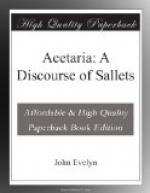Title: Acetaria: A Discourse of Sallets
Author: John Evelyn
Release Date: April 1, 2005 [EBook #15517]
Language: English
Character set encoding: ASCII
*** Start of this project gutenberg EBOOK Acetaria: A discourse of Sallets ***
Produced by David Garcia and the Online Distributed Proofreading Team.
[Illustration: Joannes Evelyn Arm^r]
ACETARIA
A DISCOURSE OF SALLETS
* * * * *
By JOHN EVELYN, Esq.
Author of the Kalendarium
* * * * *
BROOKLYN,
Published by the Women’s Auxiliary,
BROOKLYN BOTANIC GARDEN
1937
Printed in the United States of America
Publisher’s Note
This edition of Acetaria is a faithful reprint of the First Edition of 1699, with the correction of a few obvious typographical errors, and those noted in the Errata of the original edition. Whereas no attempt has been made to reproduce the typography of the original, the spirit has been retained, and the vagaries of spelling and punctuation have been carefully followed; also the old-style S [s] has been retained. Much of the flavour of Acetaria is lost if it is scanned too hurriedly; and one should remember also that Latin and Greek were the gauge of a man of letters, and if the titles and quotations seem a bit ponderous, they are as amusing a conceit as the French and German complacencies of a more recent generation.
Foreword to Acetaria
John Evelyn, famous for his “Diary,” was a friend and contemporary of Samuel Pepys. Both were conscientious public servants who had held minor offices in the government. But, while Pepys’ diary is sparkling and redolent of the free manners of the Restoration, Evelyn’s is the record of a sober, scholarly man. His mind turned to gardens, to sculpture and architecture, rather than to the gaieties of contemporary social life. Pepys was an urban figure and Evelyn was “county.” He represents the combination of public servant and country gentleman which has been the supreme achievement of English culture.
Horace Walpole said of him in his Catalogue of Engravers, “I must observe that his life, which was extended to eighty-six years, was a course of inquiry, study, curiosity, instruction and benevolence.”
Courtiers, artists, and scientists were his friends. Grinling Gibbons was brought to the King’s notice by Evelyn, and Henry Howard, Duke of Norfolk, was persuaded by him to present the Arundel Marbles to the University of Oxford. In London he engaged in divers charitable and civic affairs and was commissioner for improving the streets and buildings in London. He had charge of the sick and wounded of the Dutch War and also, with the fineness of character typical of his kind, he remained at his post through the Great Plague. Evelyn was also active in organizing the Royal Society and became its first secretary.




